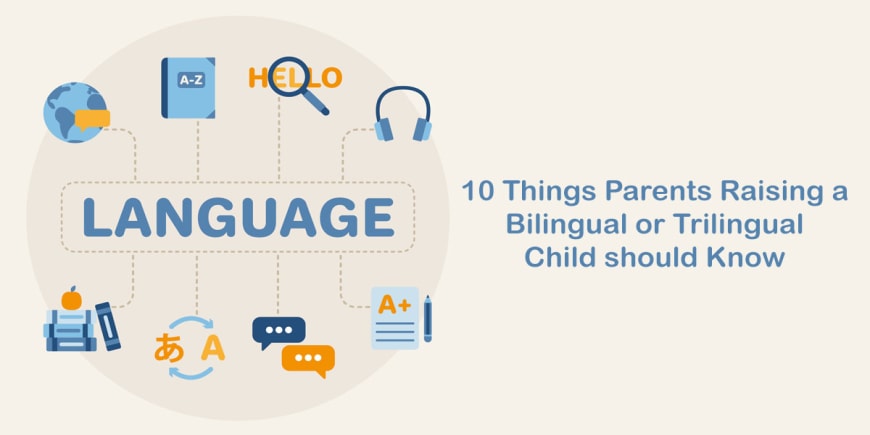10 Things Parents Raising a Bilingual or Trilingual Child should Know
Young families considering raising their child in a bilingual or trilingual home and school environment face many questions about how to succeed. As the world grows increasingly global, multilingualism and cultural fluency are valuable skills to cultivate. Studies have shown the countless benefits of immersion education in early childhood. In a bilingual or trilingual household, this trajectory towards language often begins in infancy.
1) Language Learning through Repetition
Although consistency helps build fluency, there are no hard and fast rules when it comes to immersion learning and bringing up a bilingual or trilingual child. All exposure is good exposure, and playful repetition and practice can make language-learning a pleasant pastime for young children. A basic rule of thumb is just to keep on speaking. After a period of time, parents will see words and sentences begin to stick with youngsters hungry to absorb the sounds and cadences of a new language.
2) Early exposure to a new language can enhance learning
Babies begin absorbing sounds and language in utero, so it’s never too soon to start communicating with an infant in a second or third language.
During the first weeks and months of life, a baby’s brain displays extraordinary feats of neuroplasticity. At this time, exposure to new sounds, facial expressions and gestures in various languages creates muscle
memory, which can be strengthened as the infant grows. Babies raised in a bilingual or trilingual Infant Care setting also tend to be better primed for Preschool.
3) A step forward in intellectual growth
Academic studies have repeatedly shown that bilingualism and trilingualism are associated with countless cognitive advantages in young children, such as attention control, memory, multitasking and problem-solving. Ultimately, the research overarchingly proves that bringing up bilingual babies is beneficial for their brains, sewing the seeds of school-readiness soon after birth.
4) A linguistic mash-up to convert phrases to memory
Don’t be concerned if your young bilingual or trilingual toddler mixes French and Spanish. This is a perfectly normal adaptation as young children learn multiple languages. Learning two languages, such as French and Spanish, at the same time does not negatively affect speech development. With practice, the bilingual brain learns to compartmentalize snippets of vocabulary into the two or three separate languages. This may not happen immediately; it may take time and there may be a long period during which a young child may refuse to respond in the target language.
However, rest-assured that receptive learning is helping your child commit words, sounds, expressions, and turns of phrase to memory.
5) Break the language barrier to boost your child’s confidence
Being bilingual exposes children to a diversity of cultures, ideas, and points of view. This helps increase empathy and awareness of others, and comes in particularly handy during travel or expat living. Young
globetrotting tots can build confidence without a language barrier.
Experiences abroad become more authentically immersive. Ordering food, communicating with locals, and asking for directions empowers young minds towards greater independence.
6) Learning a new language to lead longer and happier life
Recent studies have revealed evidence that bilingual people’s brains age more slowly than monolinguals’. Individuals who have mastered two or more languages often live longer and more satisfying lives. In fact, being bilingual can delay the onset of neurological diseases like Alzheimer’s and dementia.
It stands to reason that the elderly population in countries where two languages are habitually spoken, often continue to engage in social activities and remain spry into old age. This is yet another reason to boast about bilingualism.
7) Bilingualism can boost creativity and problem-solving abilities
Bilingualism trains the brain to move back and forth between two different compartmentalizing systems. This can increase mathematical acumen, and children who are learning two or more languages have been shown to have an easier time dividing objects by shapes and colors than their monolingual peers.
Similarly, multilinguals often display increased creativity, musical aptitude, and a greater ability to decode and interpret scientific information.
8) The freedom of expression, without language constraints
Bilingual and trilingual students tend to perform better in word recognition, reading and spelling, due to a superior understanding of sounds and tenses. Children with early exposure to more than one
language are also prone to developing a richer speaking vocabulary and literacy skills as they progress through school.
9) Make your child a communication expert
Being bilingual makes for better communicators. Children who are raised navigating the intricacies of relating in several languages gain increased interpersonal understanding and listening skills.
The ability to listen and respect alternate points of view is an asset which translates in the workplace, in social settings and in family life. Communication is crucial to all facets of life.
10) Encourage your children to be creative
Learning a language with a different alphabet, or a character-based language like Mandarin, Chinese, can work wonders for the brain. Most Indo-European languages are studied through letters, syllables, and a system of phonics. But languages like Mandarin require the familiarization and learning of hundreds of often complex characters. Chinese calligraphy is a challenging manual exercise itself, filled with cultural and historical significance. When practiced formally, it is an art as well as a superb tool for training fine motor skills in young immersion learners.
Parenting bilingual kids is not easy task, but the fruits of your labor will be rewarding for both your child and your family, as you pave the way to a more meaningful multicultural life with enhanced experiences.
As you and your family begin your bilingual or immersion journey, it is important to bear in mind that all language is good language. Speak, practice, sing and play in your target language (or languages).
Encourage your child to speak too and respond, try new words, embrace the unknown, cast off self-
consciousness, allow yourself to make mistakes, and enjoy watching your child be an active participant in the magical and enriching process of language acquisition.




